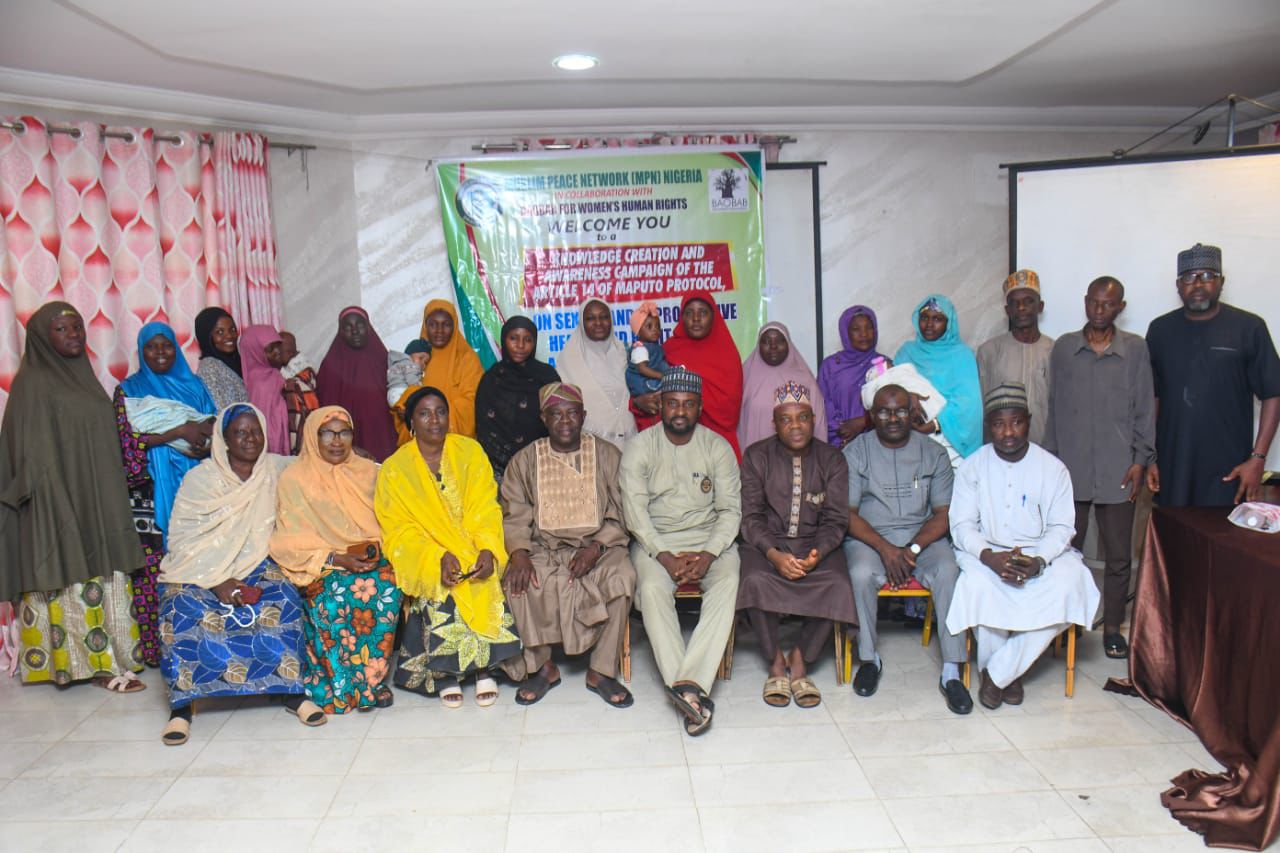“Our communities cannot afford to see women’s rights and faith as opposites, they must walk together to build peace.” says Amb. Imam Hussain Makanjuola, Executive Director, Muslim Peace Network
By Mariya Sulaiman
When Khadijah Mujeeb walked into Hotel 17, Kaduna, on Tuesday, 26 August 2025, she expected another routine community gathering. But by the end of the day, she said she felt “enlightened” in a way that could reshape not only her own life but also those of other women in her community.
“I now know that women can also have a say in sexual and reproductive issues,” she said.
“Culture has blinded us for so long, but I will share what I learned here with other women.” Mrs Mujeeb added.
Khadijah was one of about 50 women drawn from across Kaduna State who participated in a training organized by the Muslim Peace Network (MPN), in collaboration with Baobab for Women’s Human Rights. The programme focused on Article 14 of the Maputo Protocol, which guarantees women’s Sexual Reproductive Health and Rights (SRHR) and how those rights intersect with faith, culture, and community life.
The Journey of Muslim Peace Network
Founded in 2015, the Muslim Peace Network has steadily grown into one of Nigeria’s frontline organisations working at the intersection of faith, peacebuilding, gender justice, and human rights. With its headquarters in Kaduna, MPN has been active in promoting interfaith dialogue, preventing violent extremism, strengthening women’s participation in leadership, and advancing peace education in schools and communities.
Over the years, the organisation has partnered with local and international NGOs, faith leaders, and government agencies to design interventions that bring communities together while breaking cultural and religious barriers that hinder women and young people.
Its Executive Director, Amb. Imam Hussain Makanjuola, says the organisation’s heartbeat is simple: “Building peace by empowering people, especially women and youth, to understand that rights and faith are not opposites, but partners.”

According to the MPN Executive Director, the aim of organising the event and bringing the women under one roof, is sensitise women on SRHR so they can be enlightened and
be make decisions on the issues that concern them.
“Faith and Rights Can Walk Together”
For MPN, the training in Kaduna was more than a conference, it was part of its ongoing mission to close the persistent gap between global frameworks on women’s rights and the realities of grassroots communities.
“Our communities cannot afford to see women’s rights and faith as opposites,” Mr Makanjuola said.
He also noted that “Faith traditions call for dignity, education, and active participation for women. By training women directly, we are giving them the tools to challenge harmful practices and embrace their rights.”
Women’s Voices at the Heart of Change
A SRHR Consultant, Mrs. Ene Ede, representing Mrs. Bunmi Bimpe Salami, Executive Director of Baobab for Women’s Human Rights, emphasized the importance of Article 14 of the Maputo Protocol in the Nigerian context.
“Women’s rights are human rights,” she said. “For too long, women have been excluded from decisions that affect their bodies and futures.”
She encouraged women to prioritise their sexual reproductive health issues.
Also, a Psychiatrist from Kaduna Psychiatric Hospital, Dr. Zainab Sulayman Titilope stressed that SRHR is also about women having a voice in family planning and major decision-making processes within their households.

On her part, Mrs. Andrai Nikolaidou, the Executive Director of People’s Forward in Cyprus, highlighted the importance of empowering women and youth using age-appropriate SRHR and SGBV curricula, while strengthening health systems through governance training, outreach services, financing, and legal aid.

“I Will Take This Knowledge Back Home”
The training sessions were highly interactive. Women exchanged stories, challenged cultural misconceptions, and discovered how faith could be a tool for empowerment rather than restriction.
Participants like Khadijah Mujeeb and Hajia Balqees Abdul Rauf left with a renewed sense of agency.
“Now I understand that women’s voices matter in decisions about our health and bodies,” said Mrs Mujeeb with determination.
A Gathering That Sparked Commitments
The event also brought together faith leaders, NGOs, the media, and community actors, creating a shared platform for dialogue. By the end of the training, religious leaders pledged to integrate women’s rights messages into sermons, while participants promised to take their knowledge back to their communities.
The training underscored MPN’s vision of blending faith, law, and advocacy into a holistic approach to women’s empowerment.
“Protecting women’s rights is not against our values,” Makanjuola said. “It is, in fact, at the heart of building peaceful, just, and inclusive societies.”
For women like Khadijah, the message was clear: the journey to empowerment starts with knowledge, and MPN is determined to keep that knowledge flowing.


